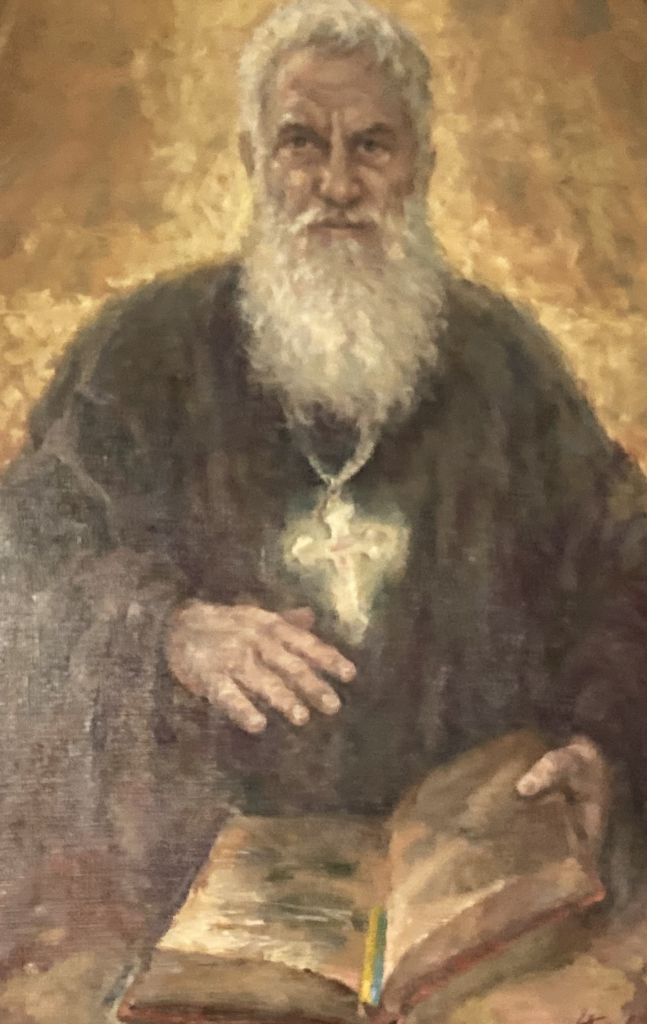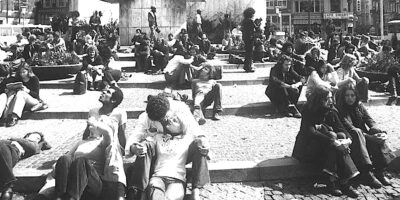In the last Weekly Word I promised – for those interested – to send these links and summaries of the writings of two Ukrainian Greek Catholic Church metropolitans, Andre Sheptytsky (1865-1944) and Sviatoslav Shevchuk (1970- ).
I. A brief history of the Ukrainian Greek Catholic Church (UGCC)
• Origins (10th–16th century): Christianity came to Kyivan Rus in 988 through Byzantine influence. After the Great Schism (1054), much of the region followed Eastern Orthodoxy.
• Union of Brest (1596): A group of bishops in the Polish–Lithuanian Commonwealth agreed to full communion with Rome while retaining the Byzantine rite, liturgy, and married clergy. This created what became the Ukrainian Greek Catholic Church.
• Suppression under Tsarist & Soviet Rule: In the Russian Empire, the UGCC was banned and forced into Orthodoxy. Under Stalin (1946), the Church was outlawed after a staged synod in Lviv and absorbed into the Russian Orthodox Church. It survived underground or in exile for decades.
• Revival after 1989: With the collapse of the Soviet Union, the UGCC resurfaced openly, regaining parishes, building seminaries, and becoming a key force in Ukraine’s religious and national identity, especially in western Ukraine.
• Today: The UGCC is the largest Eastern Catholic Church in communion with Rome, led by Major Archbishop Sviatoslav Shevchuk, based in Kyiv.
Position on the Current Russian Aggression (since 2014, intensified 2022)
• Strong Condemnation of Invasion: The UGCC leadership consistently calls Russia’s war against Ukraine unjust and aggressive. Patriarch Shevchuk has described it as a “crime against God and humanity.”
• Defense of Human Dignity & Freedom: The Church emphasizes Ukraine’s right to sovereignty, self-determination, and independence. It links Russia’s aggression with imperial oppression stretching back centuries.
• Pastoral & Humanitarian Role: The UGCC provides aid to refugees, displaced families, and soldiers’ families, operating a large humanitarian network.
• Dialogue with Rome: While Pope Francis has sometimes been cautious in his language toward Russia, the UGCC has pressed the Vatican to be clearer in calling out Russian aggression. Shevchuk has stressed that “dialogue cannot mean ignoring the cries of the victims.”
• Spiritual Framing: The Church presents Ukraine’s struggle not only as political but also as a moral and even spiritual battle — light against darkness, truth against lies, freedom against slavery.
In short:
The Ukrainian Greek Catholic Church was born in union with Rome but shaped by centuries of persecution under Moscow’s rule. Today, it is one of the most outspoken churches in condemning Russia’s war, standing firmly with the Ukrainian people both spiritually and practically.
II. Andre Sheptytsky (1865-1944): ‘Як упорядкувати свій дім‘ (‘How to put your house in order’), offers guidance for individuals, families, and for nation-building, a primer in public theology.

Sheptytsky was one of the most influential churchmen in modern Ukrainian history. He served as Metropolitan Archbishop of the Ukrainian Greek Catholic Church (1901–1944), making him the spiritual leader of millions of Eastern Rite Catholics in Galicia (then under Austro-Hungarian, later Polish, and finally Soviet/Nazi occupation).
Sheptytsky was not only a religious leader but also a statesmanlike figure:
- He promoted Ukrainian cultural revival, education, and nation-building.
- He advocated for social justice, the dignity of workers, and the importance of Christian ethics in public life.
- He worked for reconciliation between Ukrainians, Poles, and Jews. (Famously, during the Holocaust, he sheltered Jews in monasteries and even in his own residence.)
- He foresaw that Ukraine’s survival depended not only on political independence but on spiritual and moral renewal.
“Як упорядкувати свій дім”, ‘How to Put Your House in Order’
One of Sheptytsky’s short but powerful pastoral writings (c. 1900s–1910s) offers guidance for individuals, families, and the nation. Its central message is both practical and spiritual:
- Begin with the inner life – To “set your house in order” means first putting one’s soul, conscience, and relationship with God in harmony. Without personal moral discipline, external order collapses.
- Family as the foundation – He stressed the family as the “domestic church.” Order in society begins with order at home: mutual respect between husband and wife, responsible parenthood, care for children’s education, sobriety, and honest work.
- Moral economy – Sheptytsky warned against waste, dishonesty, and greed. He encouraged living within one’s means, practicing generosity, and rejecting corruption—values that were crucial for Ukrainian peasants and townsfolk seeking independence from foreign powers.
- Social responsibility – He extended the metaphor of the “house” to the wider Ukrainian nation. A people can only prosper if it builds on justice, solidarity, truth, and faith. Disorder, division, and selfishness make the national “house” vulnerable to collapse.
- Faith as the cornerstone – For Sheptytsky, genuine order in personal, family, and public life is impossible without a spiritual foundation rooted in Christ.
The Message in Context
Sheptytsky wrote this text at a time when Ukrainians were politically oppressed and socially fragmented. His message was:
- Don’t wait for political independence or foreign powers to “fix” things.
- Renewal begins with you, your family, your household, and your community.
- A nation that puts its moral and spiritual “house” in order is resilient and prepared for freedom.
This teaching has been remembered in Ukraine, especially during crises, as a call to moral self-examination and responsible nation-building.
1. Excerpt-based summary of Sheptytsky’s text “Як упорядкувати свій дім” — How to Put Your House in Order:
Sheptytsky’s tone is direct, pastoral, and practical, written for ordinary families and households. A few key lines and their sense (paraphrased from the original Ukrainian):
- On the soul:
“First of all, one must bring order into the soul. A man who lives in sin cannot live in peace, and his household will be full of quarrels.”
→ He begins by urging confession, prayer, and reconciliation with God. - On family life:
“In a house where the husband and wife love one another, there is joy. In a house where there is drunkenness, selfishness, or unfaithfulness, there is sorrow.”
→ The health of the family depends on mutual respect, sobriety, and fidelity. - On work and money:
“Do not waste what God has given you, but manage it with care. Laziness and wastefulness bring poverty. Hard work and honesty bring God’s blessing.”
→ He warns against waste, drunkenness, and corruption, urging discipline and thrift. - On raising children:
“Teach your children to pray, to tell the truth, to work, and to honor their parents.”
→ Education in virtues is more important than wealth. - On the wider nation:
“If every household is in order, then the whole nation will be in order. If in every family there is love, peace, and faith, then in our nation there will be strength and blessing.”
→ He expands the family “house” to mean the Ukrainian national house.
Or in more contemporary language:
If Metropolitan Sheptytsky were speaking to Ukrainians (or anyone) in the 21st century, his call would sound something like this:
- Start with yourself. If your heart is filled with resentment, dishonesty, or indifference, no reform, government, or foreign support can bring lasting peace. Personal integrity is the first foundation of renewal.
- Strengthen families. The nation is only as strong as its families. Build relationships of trust and fidelity. Resist addictions, violence, and selfishness. Create homes of respect where children learn truth, faith, and responsibility.
- Practice honest stewardship. Use resources wisely. Reject corruption, shortcuts, and the culture of greed. Live simply, give generously, and work diligently.
- Educate the young in virtue. True freedom depends not only on military defense or political independence but on raising children who know truth, honor, and service.
- Think of the nation as a shared house. Just as disorder ruins a home, division and hatred ruin a country. Build a society on justice, solidarity, and moral responsibility.
- Root everything in faith. Human strength alone is insufficient; only with God’s guidance can households and nations stand firm against trials.
So, the heart of Sheptytsky’s teaching: national transformation begins with personal and family transformation. If every household is a place of honesty, love, and faith, the whole country will flourish.
Unfortunately, a search of the internet could not reveal any current source of Sheptytsky’s book in English or Ukrainian.
III. Sviatoslav Shevchuk (1970- )

was elected Major Archbishop of the Ukrainian Greek Catholic Church on 23 March 2011.
On May 14, 2024, the Ukrainian Greek Catholic Church issued a ‘Letter on war and just peace in the context of new ideologies, under his signature, emphasizing the need to persevere and take active deeds of love to achieve a lasting and just peace. The letter can be read in its fullness here, while below is a summary.
- The letter highlights the importance of understanding the moral and spiritual foundations that guide actions during a time of war and upon which a just peace can be built.
- The Russian war against Ukraine raises new challenges and problems for the centuries-long tradition of understanding peace and war, and often involves a lack of understanding of the depth and seriousness of the events.
- The letter aims to assist the Ukrainian people in becoming wiser and stronger through enrichment by venerable Christian thought on peace and war, and to contribute to a better understanding of contemporary challenges by the international community.
- The roots of Russia’s war against Ukraine date back to the last century, or even earlier, and are rooted in totalitarianism, which disregards the freedom and dignity of the human person.
- The letter emphasizes the need to consider the Christian doctrine of peace and war in the light of the contemporary Ukrainian experience to bring the desired fruit and illuminate aspirations and efforts with the truth of the Gospel.
Here are some excerpts:
“Rescue the victims from the hand of their oppressors” (Jer. 22:3)
The Letter of the Synod of Bishops of the Ukrainian Greek Catholic Church in Ukraine
on War and Just Peace in the Context of New Ideologies
“Near indeed is his salvation for those who fear him;
glory will dwell in our land” (Ps. 85:10).
Dearly beloved in Christ!
Introduction
1. For ten years now we have been living in the conditions of war, and for two of these years Ukraine has been plunged into the flames of a war of liberation from the full-scale invasion of the Russian aggressor. The time of war is extremely painful and cruel: it causes countless traumas to every person and the whole of society. Every day we receive tragic news about the death of Ukrainians; many have already lost family members and friends; we are witnessing the destruction of what is most precious to us — our Homeland, our families’ well-being, our happiness, our dreams. In such circumstances it is very understandable that a person be inclined to surrender to emotions: to plunge into despair and hopelessness, or to permit hate to reign in one’s soul. These feelings of despair and hatred enslave us and violate our dignity, which the Creator gave us. Such sentiments of many Ukrainians are aptly expressed in the words of the psalmist, David: “My soul too is shuddering greatly — and you, Lord, how long…?” (Ps. 6:4); “How long will my enemy triumph over me? Look upon me, answer me, Lord, my God!!” (Ps. 13:3–4). At the same time, a part of society becomes indifferent: some people who have been affected by the war, but perhaps less than many others, try not to notice it, as if to forget about it. Behind this attitude can hide both a psychological mechanism of self-defense or the moral illness of indifference.
2. First and foremost, we need to realize that winning the fight against such an insidious enemy requires perseverance. Such perseverance has nothing in common with indifference to or distancing from the experience of the country and the people. On the contrary, perseverance is always associated with activity, with a sacrificial love that is ready to serve over a long period: “And let perseverance be perfect, so that you may be perfect and complete, lacking in nothing” (Jas. 1:4). A short-term explosion of feelings or enthusiasm cannot be sustained for a long distance. Rather, this requires enduring effort. Not in vain did Metropolitan Andrey Sheptytsky encourage young people: “It is not by a single minute’s outburst, but only by persistent struggle and unceasing sacrifices, even to blood and death for many generations, that the nation moves forward” [1]
3. Clear understanding of the moral and spiritual foundations that guide our actions during a time of war and upon which we will build our future after its end with the achievement of a just peace is absolutely necessary to ensure that our efforts are a purposeful movement toward the kind of victory we desire. Christian tradition as a whole and the social teaching of the Catholic Church in particular have a long tradition of theological and philosophical reflection on peace and war that is especially helpful in the current circumstances of our country. Thus, our goal is to share with Ukrainian society and all people of goodwill a relevant part of these treasures.
4. The Russian war against Ukraine raises new challenges and problems for this centuries-long tradition of understanding peace and war. On the international stage, we witness support for our country; yet at the same time, we also encounter a lack of understanding of the depth and seriousness of these events along with premature hopes for an easy resolution to the conflict. Sometimes we hear overly hasty calls for peace, which unfortunately are not always connected with a proper demand for justice. “They have treated lightly the injury to my people: ‘Peace, peace!’ they say, though there is no peace,” the prophet Jeremiah calls out to our consciences (Jer. 6:14). Therefore, it is worthwhile that the Christian doctrine of peace and war be considered in the light of the contemporary Ukrainian experience, so that it may bring us the desired fruit and illuminate our aspirations and efforts with the truth of the Gospel. This letter aims then, on the one hand to assist our people to become wiser and stronger through enrichment by venerable Christian thought on peace and war, and on the other, to contribute to a better understanding by the international community of contemporary challenges and the place of Ukraine on the spiritual map of today’s world.
I. Causes and Origins of Russia’s Contemporary War Against Ukraine
5. It is impossible to comprehend the reasons for Russia’s war against Ukraine and find the proper spiritual means for victory and a just peace without understanding the broader background of current events, and also without realizing the basic principles of social justice in both social relations within each state governed by the law and in international relations with the foundations of international law. The roots of what is happening today date back at least to the last century, or even much earlier.
8. A significant error of the free world after the collapse of the communist bloc was that democratic countries did not demand post-Soviet Russia, which was recognized as the successor to the Soviet Union, condemn fully the crimes of the communist period and require the new Russian rulers to ensure decommunization, lustration, and purification of their state from the consequences of totalitarianism. Nothing similar to what happened in Germany after World War II was done in Russia. There were signs of thinking not focused on spiritual values, but on economics: many in the world thought that the process of democratization in Russia would take place as if by itself, under conditions of private enterprise development, strengthening of economic levers, and trade with the free world.
II. From the “Russian World” (Russkiy mir) to “ruscism”: the Path of Degradation of the Aggressor State
12. From what has been said about contemporary Russian hybrid totalitarianism, its particular attitude toward religion and the Church follows. Orthodoxy in its Moscow-based form is being used in Russia today to fill the ideological vacuum that arose because of the fall of communism, by considering religion as a means of reinforcing state power and turning it into a political tool.
15. It is important for Christians around the world that the doctrine of the “Russian World” has been condemned by numerous representatives of the Orthodox community itself. In particular, a group of nearly 350 Orthodox theologians called it a heresy and a “vile and indefensible teaching”
Conclusion
61. How should Christians around the world act now? First of all, we need to realize the global nature of the current threat and to affirm and develop the power of just international law. The belief of some parts the world community that this war is a purely local conflict between two nations and therefore, after reconciling them, it will be possible to return to the usual comfort, is erroneous. Today all the foundations of human civilization are under threat.
67. “Jesus Christ is the same yesterday, today, and forever” (Heb. 13:8). The Lord wants His disciples now to be like they were at the beginning of Christianity: courageous in their faithfulness to the truth, so as not to turn a blind eye to terrible injustice while seeking economic gain and peace of mind. The life of Jesus — His words and deeds — are an example and a blessed light that we may understand what it is to be true human beings, created in the image and likeness of God and carrying the peacemaking power of the Holy Spirit. These words and deeds testify to His wise and just rule in the world. His example is so pure and clear that it cannot be replaced by any opportunistic diplomacy or politics that would disregard the dignity and rights of individuals and each nation.
The blessing of the Lord be upon you!
On behalf of the Synod of Bishops
of the Ukrainian Greek Catholic Church
in Ukraine
† SVIATOSLAV
Till next week,


